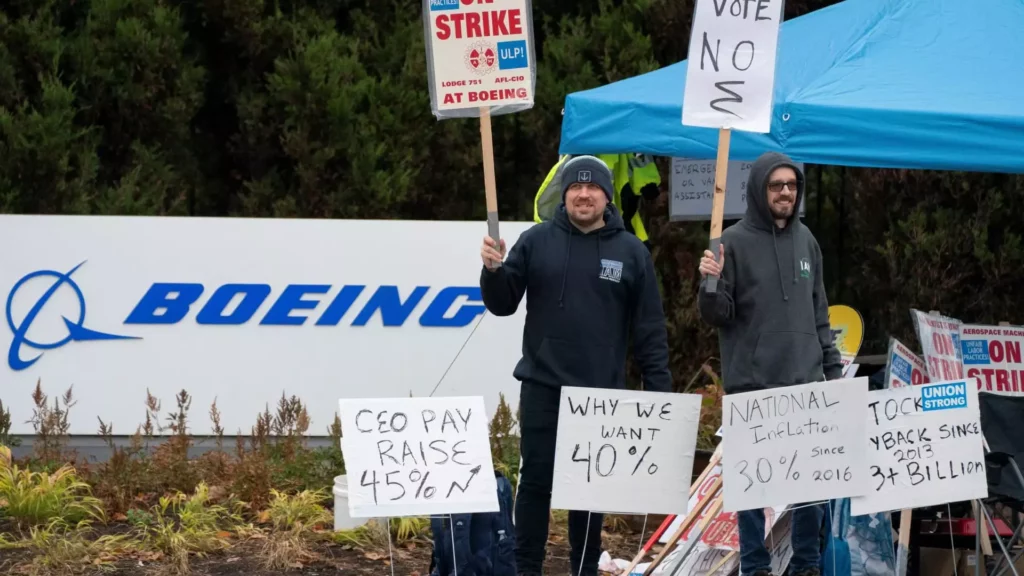Boeing, a cornerstone of the aerospace industry, is at a significant crossroads as its machinists’ union comes forward with a newly negotiated contract proposal aimed at resolving the ongoing strike that has disrupted both production and morale. This labor dispute, which began seven weeks ago, reflects the growing tension between the urgency of corporate profitability and the need for fair worker compensation amid rising living costs, particularly in the Seattle area. As the union members prepare to vote on this new proposal, the stakes are undeniably high, marking a pivotal moment in the ongoing negotiations between Boeing and its workforce.
The strike commenced after machinists rejected a prior proposal, leading to a walkout of over 32,000 workers primarily based in the Seattle region. This collective action underscores the deep dissatisfaction among employees over wages inadequately keeping pace with increasing living expenses. The newly suggested contract promises a notable increase in worker pay, proposing a 38% rise over four years—a slight improvement from an earlier offer that was deemed insufficient. Such a shift not only expresses the employees’ desire for better compensation but also highlights their commitment to advocating for their rights through organized labor actions.
The International Association of Machinists and Aerospace Workers District 751 has emphasized the necessity of approving the new offer, cautioning members that prolonged negotiations could yield less favorable terms in the future. Their sentiments echo a common theme in labor negotiations: the delicate balance between bargaining power and the risk of backtracking. By bringing attention to the potential regression of offers, the union aims to galvanize support among its members, framing this contract as an opportunity that should not be missed.
In addition to the wage increases, the new contract also includes an option for workers to receive a one-time ratification bonus of $12,000, which further incentivizes acceptance of the deal. The union leadership’s push for a timely vote is indicative of their awareness of the urgent need for a resolution—both for the company’s stability and the financial wellbeing of the employees. As Boeing faces severe financial challenges, including a staggering loss of over $6 billion in the previous quarter, getting its workforce back to work is critical for the organization’s recovery plan.
The implications of this strike extend beyond the immediate workforce; they have caught the attention of federal officials, including Acting Labor Secretary Julie Su, who has engaged with both Boeing and union representatives to facilitate a resolution. This involvement illustrates the strike’s broader impact on the U.S. economy. The halt in production not only affects Boeing but also has reverberating effects on employment statistics and economic activity nationwide.
President Biden’s acknowledgment of the strike and subsequent congratulatory message to both parties upon the new contract proposal reveal the significant political interest in the resolution of labor disputes within key American industries. The President’s statement that the machinists “deserve a strong contract” encapsulates the belief that fair labor practices are fundamental to maintaining a stable workforce while ensuring the nation’s economic health.
However, the specter of discontent looms large, particularly concerning Boeing’s past decisions that have infuriated workers—most notably the relocation of production for the 787 Dreamliner to a non-union facility in South Carolina. This act has left a sour taste among Seattle-based machinists who feel undervalued and pushed aside; balancing labor relations will require more than just lucrative contracts but also a mindful approach to employees’ sentiments and trust.
The aerospace giant’s struggles are further complicated by ongoing production issues and safety concerns associated with its aircraft, which have tarnished its reputation. The recent incidents involving safety flaws have intensified the scrutiny on Boeing, demanding that the company not just recover financially but also restore confidence in its operations and products.
As Boeing navigates this tumultuous landscape, the outcome of the upcoming vote will be more than a reflection of the union’s bargaining success; it will also serve as a critical indicator of the company’s ability to rebuild trust and stability in a rapidly changing economic environment. The choices made now will shape Boeing’s trajectory and ultimately affect the livelihoods of thousands of workers, their families, and the broader aerospace community.

